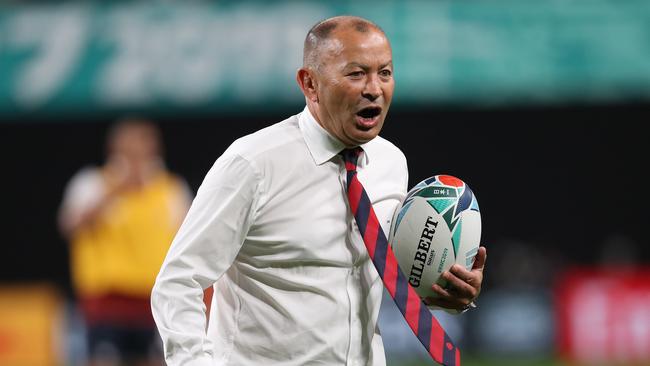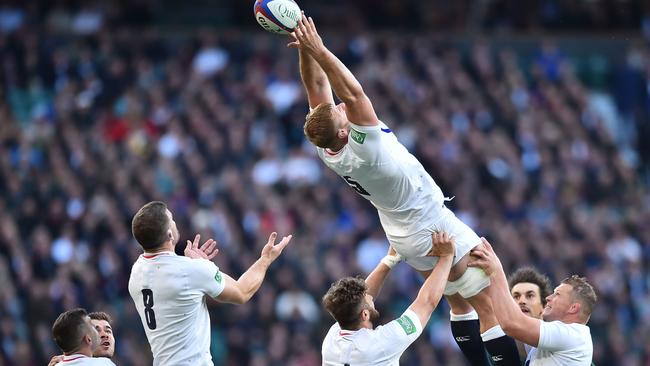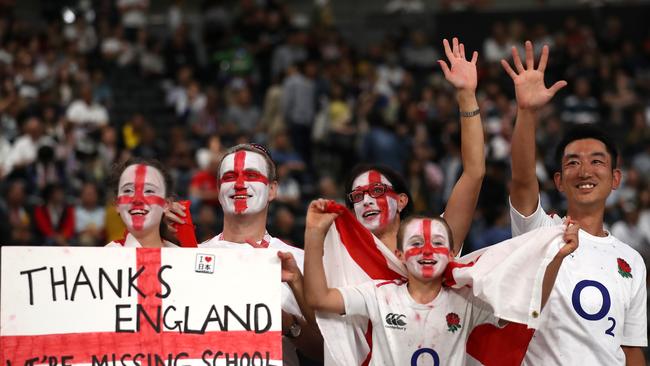‘Surely this can’t be right?’: English captains blow up at call to ban iconic rugby song over slavery link
Swing Low, Sweet Chariot has become a staple of an England rugby match day at Twickenham - but its origin is causing a lot of controversy amid a Rugby Football Union review into racism.

Rugby
Don't miss out on the headlines from Rugby. Followed categories will be added to My News.
- Kiwi offer gives ‘anxious’ Aussies something to dream on
- New boss brings in big guns as WC becomes major focus
England rugby fans could be banned from singing Swing Low, Sweet Chariot at games over the song’s associations with slavery.
Fans can usually be heard bellowing out the song from the stands at Twickenham but it’s now being examined after the Rugby Football Union launched a review into racism.
The review was started after Black Lives Matter supporters called for a review of Britain’s cultural past and its links to the slave trade.
Super Rugby returns! Watch every game of Super Rugby Aotearoa and Super Rugby AU Live & On-Demand on Kayo. New to Kayo? Get your 14-day free trial & start streaming instantly

Protests flared up following the death of George Floyd in Minneapolis while he was in police custody.
The traditional song was written by a black slave in southern America during the 19th century but is said to have been taken up by England fans when two black wingers - Martin Offiah and Chris Oti - became sporting heroes on the pitch at the end of the 1980s.
Former English cricket captain Michael Vaughan took clear umbrage to calls to ban the iconic song in a post on Instagram, asking his followers: “Please tell me if I am wrong .. but this surely can’t be right !!??”.
The post was liked by former English football skipper John Terry.
The RFU said it was determined to “accelerate change and grow awareness” but also noted the importance the song had for supporters as they roused the national side against their opponents on the pitch.
A spokesperson said: “The Swing Low, Sweet Chariot song has long been part of the culture of rugby and is sung by many who have no awareness of its origins or its sensitivities.
“We are reviewing its historical context and our role in educating fans to make informed decisions.”
The Twickenham ground is also covered with lyrics to the song including the line “Carry Them Home” which is also used as a marketing tool.
The song has also been released as an official England World Cup song during tournaments in the past.
Swing Low, Sweet Chariot is said to have been written by Wallace Willis, a native American who was a slave in the Deep South before the Civil War.
A minister is thought to have transcribed the words and the song became known after the African American group The Jubilee Singers popularised it during tours of the US, the UK and Europe in the early 20th century.

Phil McGowan, of the World Rugby Museum thinks Swing Low, Sweet Chariot, was first used in 1987 while Offiah was playing, whose nickname with fans was Chariots Offiah due to his fast speed.
The reason why fans sung the song had been unclear until footage of the song being sung while Offiah was in action on the pitch emerged earlier this year.
McGowan told the BBC the footage of Offiah “solved the mystery of why on earth were they were singing this song”.
The England and Saracens star Maro Itoje, 25, has already raised concerns about the song.
”I don’t think anyone at Twickenham is singing it with malicious intent, but the background of that song is complicated,” he said this week.
The RFU has appointed Genevieve Glover as head of a diversity group which will look at ways rugby can be more inclusive and end institutional racism.
This article was originally published by The Sun and reproduced with permission.
Originally published as ‘Surely this can’t be right?’: English captains blow up at call to ban iconic rugby song over slavery link
